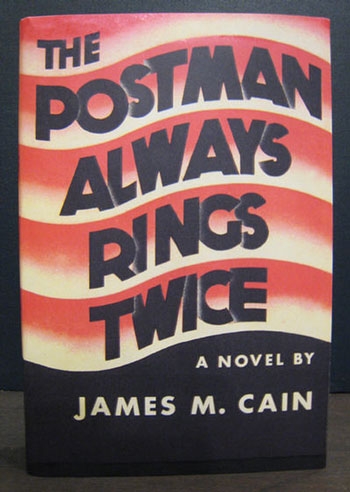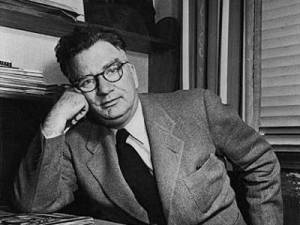I’m throwing down the gauntlet, Washington College.
In 1934, James M. Cain shocked the nation with his best-selling The Postman Always Rings Twice, a book his biographer Roy Hoopes would call “one of the first big commercial books in American publishing.”
 In the 1946 cinema version of Postman Lana Turner and John Garfield scorched the silver screen with smouldering eroticism as they planned the murder of her immigrant husband. Jack Nicholson and Jessica Lange would ignite that scene 40 years later.
In the 1946 cinema version of Postman Lana Turner and John Garfield scorched the silver screen with smouldering eroticism as they planned the murder of her immigrant husband. Jack Nicholson and Jessica Lange would ignite that scene 40 years later.
Twenty years earlier, James Cain was listening to bricklayers talk as they constructed the sidewalk along Washington Avenue in Chestertown, where his father was president of Washington College. Eastern Shore dialect and “real talk” became a trademark of his dialogue.
Cain graduated from the college in 1910—he entered at 14— and went on to work as a road inspector, teacher, singer, police reporter and soldier during WWI before finding newspaper work with various publications including The Baltimore Sun where he was a protégé of H.L Mencken. He also had a brief stint as editor of the New Yorker Magazine.
During the Depression, Cain went to Hollywood to scratch out a living as a screenwriter. In the company of Raymond Chandler and William Faulkner, and encouraged by the great publisher Alfred Knopf, Cain also worked on Postman.
A year later Double Indemnity became an immensely popular serialized novel—influenced by his police reporter’s eye on a sensational 1927 murder trail—and amplified his fame with the movie by the same name, scripted by none other than Raymond Chandler. Chandler called Cain, “Proust in dirty overalls.”
The infamous Mildred Pierce followed, along with the movie version that gave Joan Crawford her only Academy Award. HBO recently revived interest in Cain with a five-part miniseries starring Kate Winslet. The production upheld Cain’s dialogue almost verbatim.
But for decades following Cain’s last big book, it seemed as though thoughtful criticism of his work required wearing an intellectual Hazmat suit. Many critics dismissed him as a lightweight, even as a moral leper.
To noirish authors of his day, Cain represented a deformed vision of life, godless without heroes or heroic goals. Moral compasses, they felt, were buried under landscapes of obsession and depravity. His gender roles became legitimate targets for feminist’s disdain, and the shock value of his plots, from incest to adultery, seemed shopworn to a readership cynical enough to praise Fifty Shade of Gray.
Others, however, consider James Cain a master of the Noir or “hardboiled” genre. Edmond Wilson called Cain “one of America’s poets of the tabloid murders.”
In a way, Cain hinted at an emotional-dystopian world similar to Cormac McCarthy’s The Road. His characters were never in a well-lighted place. If he’d been a musician—and he wanted to be—he might have foreshadowed punk rocker, Johnny Rotten.
Iconoclasts are usually appreciated after the sting of the whiplash subsides.
Seven months before he died in 1977 in Hyattsville, Cain granted an interview to Paris Review’s David Zinsser, the Art of Fiction No. 69.
When asked about his writing style, specifically his dialogue, Cain answered—now famously—with his story about the bricklayers at Washington College.
“Let’s talk about this so-called style. I don’t know what they’re talking about—“tough,” “hard-boiled.” I tried to write as people talk. That was one of the first arguments I ever had with my father—my father was all hell for people talking as they should talk. I, the incipient novelist, even as a boy, was fascinated by the way people do talk. The first man I ever sat at the feet of who enchanted me not only by what he told me but by how he talked, was Ike Newton, who put in the brick walk over at Washington College, right after my father became President. My father decided we needed a new brick walk down the side of the campus instead of the boardwalk they had. …But he had Ike Newton put in a brick walk and I would sit out there while he worked, listening to him. He was a stocky man, rather nicely put together. He had a hammer with a screwdriver in the end of it that he’d tap the bricks with. Well, Ike Newton put the bricks in, gauging them with his eye, and doing a beautiful thing, and as he worked he talked. The way he’d use language! I’d go home and talk about it, to my mother’s utter horror, and to my father’s horror, too, because he was such a shot on the way people should talk. My childhood was nothing but one long lesson: not “preventative” but “preventive”; not “sort of a” but “a sort of”; not “those kind,” but “that kind” or “those kinds.” Jesus Christ, on and on and on.”
Here’s my challenge.
Washington College prides itself for its creative writing program. Scholarships and awards are offered to students promising bright talent. Authors, famous and emerging are invited to read and work with the students while recognition has been given to alumni who have succeeded in the publishing world.
But still, Cain continues to languish as if in the small company of “embarrassing family members” outside the party, where even a waiter would cringe to deliver a glass of water.
And yet, he may be one Washington College’s most famous authors.
It’s too easy to dismiss Cain for his moral ambiguities, his billboard size characters or the appearance of their lack of self-reflection. In Cain’s universe, redemption was thrown off the bus at noon. Life played out in the shadows.
Why should there not be a College sponsored weekend honoring James Cain as a master of Noir fiction, who learned his craft in the classrooms of Washington College and on the streets of Chestertown?
The Folio Society writes in their introduction to The Postman Always Rings Twice:
“ Today it is seen as one of the most important crime novels of the 20th century – translated into 18 languages and listed in the Modern Library’s 100 Best Novels. Described by the New York Times as a ‘six-minute egg’, it epitomises the hardboiled roman noir.
How about it, W.C.? A Noir Weekend, a limited edition of one of his stories?
James Dissette is managing editor of the Chestertown Spy, a Washington College graduate and was awarded the school’s Sophie Kerr Prize for Literature in 1971.



Carla Massoni says
Wow! What fun that would be. Let’s do it – even if WC doesn’t!!!
Bob Foss says
Great story, James. Cain certainly deserves his day in the sun at Washington College.
Bob Foss
Chestertown
Hugh Silcox '75 says
His father’s brick sidewalk — still paralleling Washington Avenue if memory serves — would be a natural site for a roadside historical marker noting Cain’s association with the College.
Tom mchugh says
Bravo jim,
This is the sort of a nudge that could grow to a push.
Tom McHugh
Marty Stetson says
I have lived here for 50 years and I did not know James Cain grew up here and graduated from Washington College. I did know of his father as his name is noted several places on campus. I really wonder why it has been kept a secret, you would think it would be something that the college would tout as they have others of lesser fame who had graduated from the college. That is kind of a mystery in its self.
James Dissette says
I just received a note from Kate Moncrief, Chair of WC English Dept. telling me that there was indeed a “Noir” weekend in 2007 that included a tribute to Cain’s work by film-noir authority R. Barton Palmer. I’m happy to find this out and still think that a joint celebration by the college and the community might be a fun and creative bridge-builder. The constellation of Depression era art, music, theatre, and literature could make for an another interesting weekend.
Chris Ames says
Thanks to Jim for the article and to Kate Moncrief for remembering the lecture and film showing (“Double Indemnity”) that I organized with the English Department (Palmer wrote one of the key early introduction to film noir). I also contributed a piece to the alumni magazine on the topic at the time. I agree, however, that the association is worthy of continued recognition, perhaps with a big assist from the Literary House. Cain is one of the most important and interesting of the American writers drawn to Hollywood, and as Jim’s article outlines, his connection to Washington College and Chestertown is significant (he grew up here, he studied here, he taught here, there’s a building named after his father). I would recommend the very fine biography by Roy Hoopes, an excellent writer from Baltimore and the Eastern Shore.